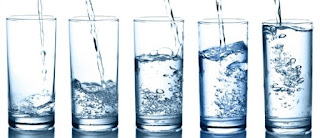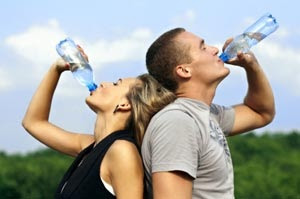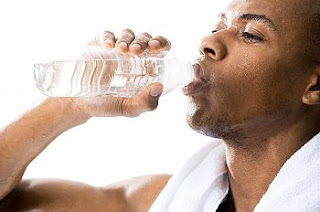Last week we gave you
lots of ideas on HOW to hydrate –
different ways to drink your daily recommended amount of H20, I hope you’ve
taken those ideas on board and are getting closer to consuming your 6-8 glasses
of water a day!
This week then, just in
case you’re not quite there yet, we are looking into WHY (rather than how) we need to drink water and stay hydrated.
- To start with – there are 7 essential nutrients our bodies require to function at their best. 6 of the most commonly recognised are: Proteins, Fats, Carbs, Fiber, Vitamins and Minerals. The magic 7th = WATER
- Water makes up between 50-75% of our bodyweight
- You can live for days – even weeks – without food, but not much longer than a day without water – it really is a hugely overlooked essential!
- Water works in our bodies like oil in a car – for example: if fuel = food, providing the energy, oil = water, helping everything work properly
- Muscle holds more water than fat
- Younger bodies hold more water than older (probably due to higher muscle mass)
- Recent studies show 1 in 4 people don’t drink enough!
In no particular order then, these are some of the main
functions of water in our bodies (and why we need to keep well hydrated):
1) Water aids digestion, dissolving nutrients and moving
everything along the digestive system
2) Water lubricates our joints and organs
3) Water helps build and repair the body
4) Water regulates our temperature
5) Water transports oxygen from our blood into our cells
6) Water aids the kidney function
7) Water removes toxins and waste products via urine /
excretion
8) Water metabolises nutrients efficiently
Dehydration therefore can lead to the following:
1) Headaches
2) Reduced energy / fatigue
3) Constipation
4) Delayed reaction times
5) Irritability
6) Impaired coordination
7) Mental confusion
8) Nausea / dizziness
9) Low blood pressure
Chronic dehydration can lead to: Kidney Stones, UTI’s, Bowel and/or Bladder
Cancers, Stroke and eventually Death
- Our bodies are very good at regulating our water balance. We “store” water in the same way a sink without a plug does – ie we need to keep topping it up as it keeps draining away
- The draining is a good thing however, as helps in eliminating the bodies waste products via urination, defecation, sweating and even breathing out
- If we retain water it can be a sign of hormonal change (especially in women), or more worryingly perhaps a sign of live or kidney disease
General Fluid Requirements:
Last week we quoted the
UK recommended average of 2 litres / 8 glasses per day, however let’s remember
realistically everyone’s fluid requirements differ, based on individual energy
requirements, which in turn are based on your age, weight and activity levels, plus
environmental factors such as temperature (hence this 2 part blog as summer
approaches and the humidity rises).
So a more realistic requirement per person equates to:
1ml water for every kcal
burned
eg: a reasonably active,
average height and weight male will burn approx. 2,500 kcals per day, therefore
requiring 2.5 litres of water per day, whereas an athlete in training may burn
7000 calories daily and require up to 7 litres of water!
We realise there are many
reasons you may not get this required amount however. The body can become
dehydrated, perhaps via heavy sweating, diarrhoea, vomiting or alcohol abuse – also
untreated/undiagnosed diabetic patients can suffer from a constant thirst. As we mentioned earlier however the body is
very good at regulating fluid balance and it does so though the action of electrolytes
(made up mainly of sodium, potassium and chloride). Electrolytes can also be lost via heavy
sweating, diarrhoea, vomiting and alcohol abuse too though.
So in order not to lose electrolytes that regulate our water
balance:
- Don’t wait until thirsty to drink
- Drink little and often throughout the day (keep topping up the sink)
- Never start exercise or activity if already at all dehydrated
Hydration / Dehydration During Exercise:
A good way to figure out how much fluid you need to replace
when exercising is by weighing yourself before and after a session.
Weight loss = fluid loss
1kg = 1 litre
eg: to drink enough
during an exercise session, ensure if you lose 1kg, you sip up to 1 litre of
water throughout the session.
- For most recreational sports its recommended you take on 600-800mls per hour at regular intervals, then you rehydrate afterwards too, just as soon as you can.
- Don’t wait until you are thirsty before, during or afterwards though, drink throughout.
- If your activity session lasts longer than an hour at a moderate to high intensity, you may want to start replacing those electrolytes as well as just the water too. This can be done via sports drinks and formulas BUT a simple home made mix can also help:
MIX: 250mls fruit juice
(unsweetened and not from concentrate!) with 250mls plain water and add a pinch
(no more than ¼ teaspoon) of salt
Over Hydrating:
Last but not least now we
know WHY we need to hydrate, HOW to hydrate and WHAT happens when we dehydrate, so lets also note HYPERHYDRATION. Surprisingly, you can in fact drink too much water.
Too much water will dilute your bodies electrolytes and can lead to
collapse or coma or even death. This is however very rare. It can
happen to long distance runners for example who are losing electrolytes by
sweating a lot over a long period of time, or those on extreme or long term
detox regimes at risk of over exercising and/or excessive water consumption without replacement of
salts and electrolytes too.
So that concludes our 2 part hydration low down.
HAPPY HYDRATION !!
Of course, as always, if you’d like more info: info@nitakothari.com
To book a consultation: bookings@nitakothari.com
And to find out more, share the knowledge and get involved:
**Please note recommended fluid intake
for breastfeeding mothers and those on diuretics for example will differ**
**If you are of ill health, pregnant or
a child under 16yrs, please be advised water consumption guidelines may
differ**
**Please remember this is nutritional
advice ONLY (as is all other information and advice contained in this blog and
the websites and social media related to it) – none of the info or advice is
intended to override any recommendation from your GP or health professional**







No comments:
Post a Comment